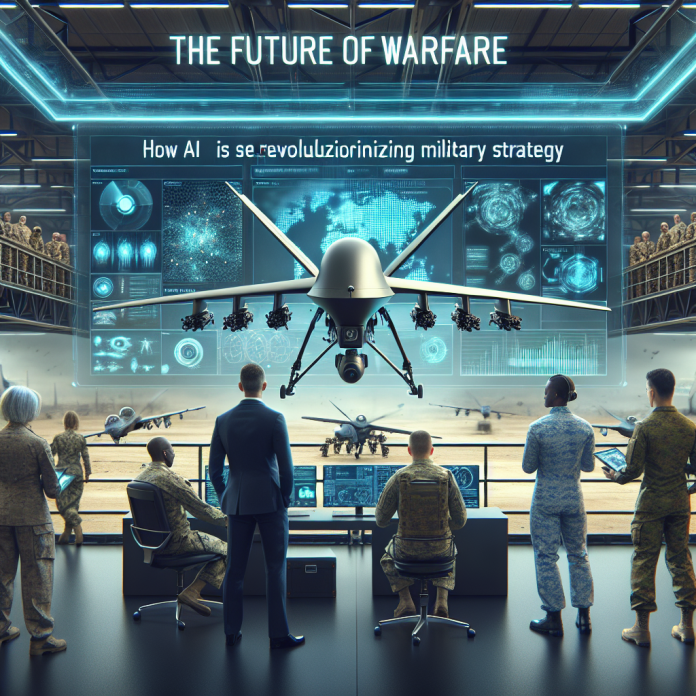**The Rise of AI in Military Strategy**
In the world of military strategy, the utilization of artificial intelligence (AI) is becoming increasingly prominent. AI has the potential to revolutionize the way wars are fought, making operations more efficient, effective, and even autonomous. From unmanned drones to sophisticated algorithms that can predict enemy movements, AI is reshaping the battlefield in ways previously unimaginable.
**The Evolution of AI in Warfare**
The use of AI in military strategy is not a new concept. In fact, AI has been used in various capacities in warfare for decades. One of the earliest examples of AI in military strategy dates back to the 1980s when the United States military developed the Strategic Defense Initiative, also known as “Star Wars.” This program utilized AI to help track and intercept incoming ballistic missiles.
Since then, AI has continued to evolve and expand in its capabilities. Today, AI is being used in everything from intelligence gathering to target identification to autonomous weapon systems. The rapid advancement of AI technology has opened up new possibilities for militaries around the world, enabling them to gather data, make decisions, and execute operations with greater speed and precision than ever before.
**AI in Intelligence Gathering**
One of the key areas where AI is making a significant impact in military strategy is intelligence gathering. Traditionally, intelligence gathering involved sifting through vast amounts of data to identify threats and make sense of complex geopolitical situations. This process was often time-consuming and labor-intensive, with analysts spending hours poring over reports and satellite images.
With the advent of AI, this process has been streamlined and accelerated. AI algorithms can analyze massive amounts of data in a fraction of the time it would take a human analyst, identifying patterns and trends that might otherwise go unnoticed. This has enabled militaries to gather intelligence more quickly and effectively, giving them a critical edge in identifying and neutralizing threats.
**AI in Target Identification**
Another area where AI is playing a crucial role in military strategy is target identification. In the past, identifying enemy targets on the battlefield was a laborious and error-prone process. However, with the help of AI, militaries can now use sophisticated algorithms to analyze data in real-time and pinpoint enemy positions with remarkable accuracy.
For example, AI-powered drones can autonomously identify and track enemy targets using advanced imaging systems and machine learning algorithms. This allows militaries to strike with precision and efficiency, minimizing collateral damage and maximizing the effectiveness of their strikes. As a result, AI is transforming the way militaries identify and engage enemy targets, making operations more effective and reducing the risk to friendly forces.
**AI in Autonomous Weapon Systems**
Perhaps the most controversial application of AI in military strategy is the development of autonomous weapon systems. These are weapons that can operate without direct human intervention, using AI algorithms to select and engage targets on their own. While autonomous weapon systems have the potential to revolutionize warfare by enabling faster decision-making and reducing human casualties, they also raise ethical and legal concerns about the use of lethal force without human oversight.
Despite these concerns, militaries around the world are investing heavily in the development of autonomous weapon systems. For example, the United States military has tested autonomous drones that can operate in swarms and use AI algorithms to coordinate their attacks. Similarly, Russia and China are also developing autonomous weapon systems that could redefine the battlefield in the years to come.
**The Future of AI in Military Strategy**
As AI continues to advance and evolve, its role in military strategy is only expected to grow. From intelligence gathering to target identification to autonomous weapon systems, AI is reshaping the way wars are fought and won. However, with this rapid advancement comes a host of challenges and ethical considerations that must be addressed.
The use of AI in military strategy raises important questions about the ethics of autonomous weapon systems, the potential for unintended consequences, and the need for international regulations to govern their use. As AI becomes increasingly integrated into military operations, it is crucial that policymakers, military leaders, and the public engage in meaningful dialogue about the implications of this technology and how best to harness its capabilities while mitigating its risks.
In conclusion, AI is transforming the landscape of military strategy in profound and unprecedented ways. From intelligence gathering to target identification to autonomous weapon systems, AI is enabling militaries to operate more efficiently and effectively than ever before. However, as this technology continues to advance, it is essential that we grapple with the ethical and legal challenges it presents to ensure that AI is used in a responsible and ethical manner on the battlefield.

